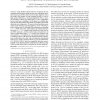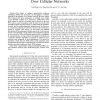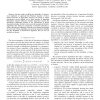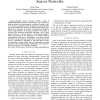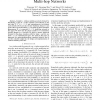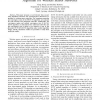108
Voted
GLOBECOM
2008
IEEE
15 years 7 months ago
2008
IEEE
— Large MIMO systems with tens of antennas in each communication terminal using full-rate non-orthogonal spacetime block codes (STBC) from Cyclic Division Algebras (CDA) can achi...
124
Voted
GLOBECOM
2008
IEEE
15 years 7 months ago
2008
IEEE
—The design of optimal opportunistic multicast scheduling (OMS) that maximizes the throughput of cellular networks is investigated. In a cellular network, the base station (BS) t...
116
Voted
GLOBECOM
2008
IEEE
15 years 7 months ago
2008
IEEE
Abstract— Recent results establish the optimality of interference alignment to approach the Shannon capacity of interference networks at high SNR. However, the extent to which in...
98
Voted
GLOBECOM
2008
IEEE
15 years 7 months ago
2008
IEEE
— In this paper, we propose a new decoding algorithm for quasi-orthogonal space-time block codes (QOSTBCs) which achieves near Maximum Likelihood (ML) performance while substanti...
105
Voted
GLOBECOM
2008
IEEE
15 years 7 months ago
2008
IEEE
Abstract—This paper aims at validation of an iterative receiver for Multiple-Input Multiple-Output with Orthogonal Frequency Division Multiplexing (MIMO-OFDM) systems using real-...
110
Voted
GLOBECOM
2008
IEEE
15 years 7 months ago
2008
IEEE
—Wireless Sensor Networks (WSNs) consist of spatially-distributed autonomous sensors that can cooperatively monitor physical and environmental conditions. Because of sensors’ r...
74
Voted
GLOBECOM
2008
IEEE
15 years 7 months ago
2008
IEEE
— The multihop spatial reuse Aloha (MSR-Aloha) protocol was recently introduced by Baccelli et al., where each transmitter selects the receiver among its feasible next hops that ...
144
Voted
GLOBECOM
2008
IEEE
15 years 7 months ago
2008
IEEE
Abstract—In this paper, we investigate and analyze the expected per-node throughput in a wireless sensor network under a randomized sleep scheduling framework with a connectivity...
110
Voted
GLOBECOM
2008
IEEE
15 years 7 months ago
2008
IEEE
—Consider a wireless multi-hop network formed by distributing a total of n nodes randomly and uniformly in the unit cube [0, 1]d (d = 1, 2, 3) and connecting any two distinct nod...
99
Voted
GLOBECOM
2008
IEEE
15 years 7 months ago
2008
IEEE
Abstract—This paper proposes a novel discrete time secondorder distributed consensus time synchronization (SO-DCTS) algorithm for wireless sensor networks. The consensus properti...
